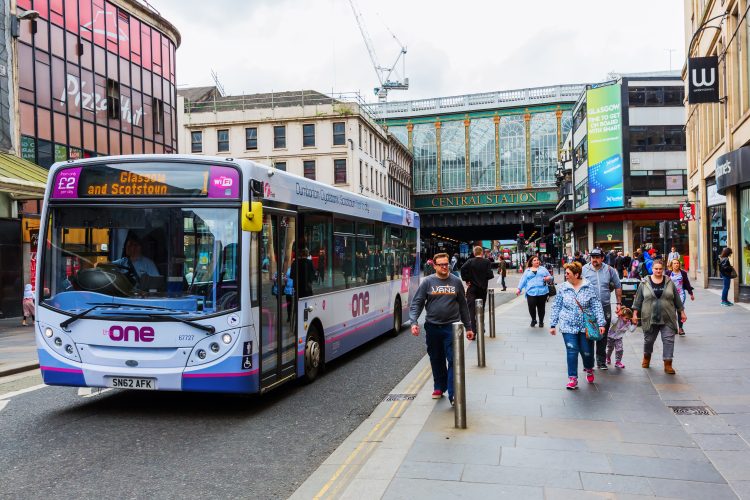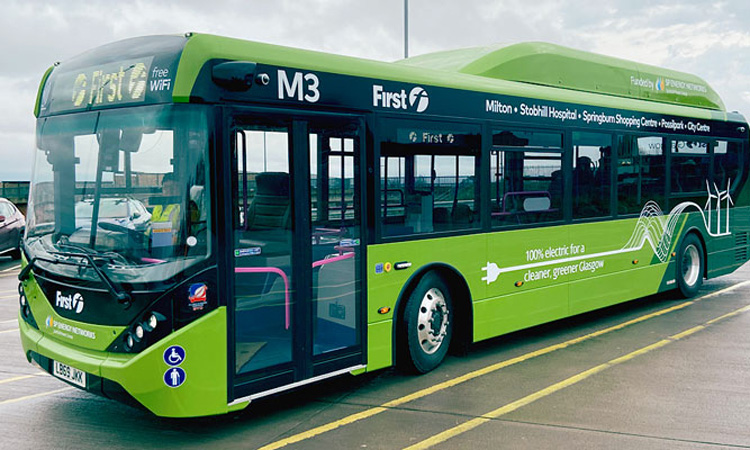First Glasgow: Transformation at Caledonia and beyond
- Like
- Digg
- Del
- Tumblr
- VKontakte
- Buffer
- Love This
- Odnoklassniki
- Meneame
- Blogger
- Amazon
- Yahoo Mail
- Gmail
- AOL
- Newsvine
- HackerNews
- Evernote
- MySpace
- Mail.ru
- Viadeo
- Line
- Comments
- Yummly
- SMS
- Viber
- Telegram
- Subscribe
- Skype
- Facebook Messenger
- Kakao
- LiveJournal
- Yammer
- Edgar
- Fintel
- Mix
- Instapaper
- Copy Link
Posted: 15 July 2021 | Andrew Jarvis - First Glasgow | No comments yet
First Bus has recently announced that its Caledonia depot is to become the UK’s largest Electric Vehicle (EV) charging hub, marking a significant step towards the bus operator’s net zero targets, as well as the UK’s wider ambitions. Andrew Jarvis, Portfolio Managing Director, takes a deeper look at the project.


The transformation of Glasgow's Caledonia depot could revolutionise the Scottish city's bus service
It’s an exciting time to be part of the bus industry. The pandemic has been a huge challenge for the sector, but as we emerge from lockdowns and the restrictions continue to ease, it’s clearer than ever that bus travel will be an integral part of the green recovery, helping us build back better.
Of course, at its core the role of bus operators is to create connections and manage useful routes that get people from A to B, and as restrictions ease, we’re eager and prepared to help re-connect people to work and fun. Recently though, our mission to manage reliable and efficient public transport had been equalled in importance by our responsibility to ensure that transport is as sustainable and green as possible for the communities we serve.
Scotland is leading the world on climate action, with an ambitious target to reduce greenhouse gas emissions 75 percent by 2030. At First Glasgow, we are passionate about the role we must play in making this happen, and we believe that the work we are doing in Glasgow will serve as a green transport model to other cities.
The Caledonia transformation
The Caledonia depot in Glasgow is the UK’s largest, making its electrical transformation an ambitious project. In March 2023, once the project is complete, the depot will have space to charge up to 300 EV buses on site. The project has a phased completion schedule, with Phase One expected to be complete by September this year, allowing for the introduction of an additional 22 electric buses to Glasgow’s streets. A further 126 EV buses will be delivered and in service over 2021 and 2022, taking the total electric fleet in the city to 150 (including two EVs already in service).


Electric buses have become a part of First’s fleets across the UK in recent years
This transformation is in part supported by £28.2m in funding from the Scottish Government’s Scottish Ultra Low Emission Bus Scheme (SULEB). Since the introduction of the first two electric buses by First Glasgow in 2019, the Scottish Government and Scottish operators have been keen to continue making progress towards net zero targets.
SULEB funding, which provides up to 75 percent of the gap funding between diesel and alternative fuelled buses, along with 75 percent towards the cost of infrastructure changes, has been instrumental in allowing large scale changes such as this project to take place. It’s a wonderful example of what can happen when governments, local authorities and private companies share a vision and collaborate effectively – with the right resources and the right people real progress can be made.
The Caledonia depot transformation is also a fantastic example of work being done now to benefit everyone in the future. Not only will it enable us to power more electric vehicles in the immediate future, it gives us the capacity for us to expand. As it stands, we have funding for 150 vehicles, but our plans mean that we will have space for an additional 150 on top of that, leaving Glasgow well set up for more electric vehicles. This forward-thinking mindset is critical for us to meet our ambition of running a zero-emissions fleet.
What does this mean for Glasgow?
Ultimately, bus travel needs to be convenient and reliable, and the switch to electric has to be backed up by providing a good service that makes communities want to use their cars less and the bus more.
Alongside the Caledonia project, we have recently joined with other bus operators in Glasgow to form a bus alliance called GLAS-GO, with the aim of improving sustainable travel, and growing bus patronage by 25 percent over the next five years. We have also created a new Bus Service Improvement Plan with local authorities to submit a bid to the Scottish Government’s £500m bus improvement fund to improve bus priority, improve journey times and help buses tackle congestion in the city in order to make taking the bus a more attractive option for passengers. Collaboration is key to create real behavioural change and we are proud to be working with other bus companies in the region to bring real benefits to everyone.
What does this mean for Scotland and the rest of the UK?
Our efforts, coupled with the impending introduction of Glasgow’s low emission zone, mean that Glasgow is quickly shaping up to be the city to look to for lessons in how to establish and grow a green public transport network and make changes that will amplify the positive benefits of alternative power, be it electricity, hydrogen, or biofuel.
As we approach the UK Government’s 2050 deadline for achieving net-zero emissions, we will be able to advise other transport operators on how to work with local authorities and other partners to make real changes in their communities, as we’re learning valuable lessons and gaining key insights early on.
I wrote at the beginning of this piece that it’s an exciting time to be part of the bus industry – not only are we having to overcome one of the biggest challenges we’re likely to ever face in the form of the pandemic, but we’re also making great strides to become a cleaner, greener industry, which will create positive impacts for all of us, well beyond our networks. Truly, we have the opportunity to level up and build back better.
Biography
Andrew Jarvis has led multi-site operations for the last 21 years and has been a Director for 15 years, initially with Stagecoach plc and latterly with First Group plc.
Andrew has been a Managing Director of bus and coach business’ across Scotland for the last 11 years and for the past four years as Managing Director, Scotland for First leading a team of around 3200 people using over 1200 vehicles to deliver over 130 million passenger journeys a year.
In May 2021, Andrew was promoted to Portfolio Managing Director responsible for First Bus’ nine operating companies in Scotland, Wales and the North of England.
Related topics
Air Quality, Alternative Power, Infrastructure & Urban Planning, Public Transport, Sustainable Urban Transport
Related modes
Bus & Coach
Related organisations
First Bus, First Glasgow








